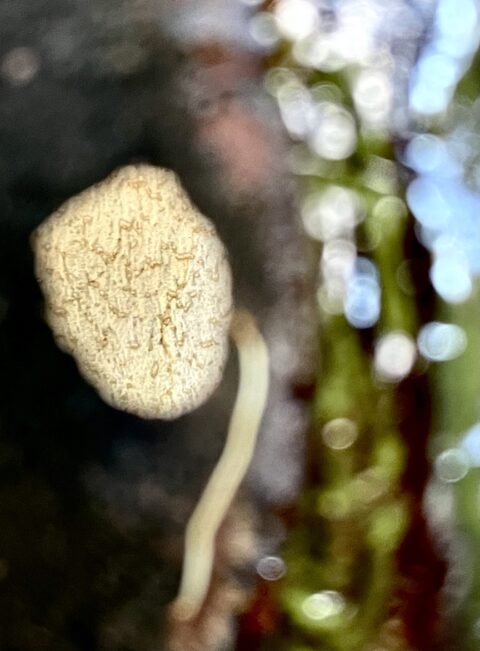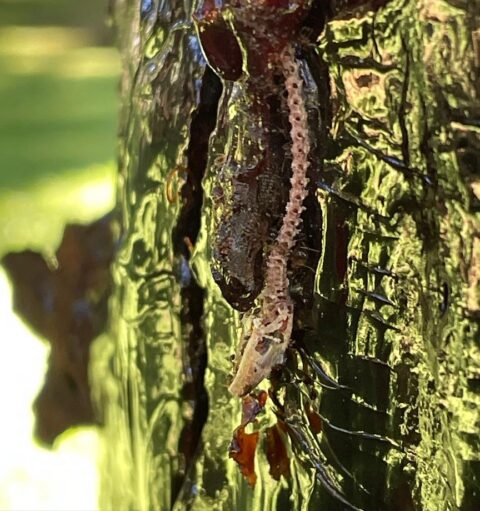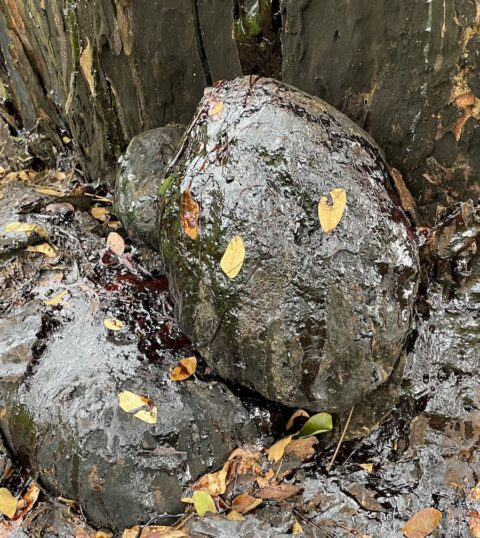from I and Eucalyptus
Asked to take photos at different times of day, I walked out into gray rain this morning. I walk out into gray in the afternoon. I walk out again at evening into the gray. “If weather gets in the way, take photos of the weather,” I remember saying, but this assignment presumes different weathers. Whether gray or gray again, attend to its layers. Then attend to trees, their ribbons of wet bark like highways to an approximate gray heaven. Wrote “bard” for “bark,” though bark is what we need in this after-drought of flood watches. Who watches the flood still gets drenched by it. We don’t get to Eucalyptus today, the dog and I, though I imagine (as in remember) the blacks that turn to brown, the sap drops like jewels reflecting my red cap (when it’s not so gray). The relation to the You is unmediated. But gray is our medium, foretelling more. From this room I sense the tree in the park. We’re taught to avoid the present tense, but the tree feels present, tense. There’s a light in my room, more white than gray.
Insofar as a human being makes do with the things that he experiences and uses, he lives in the past, and his moment has no presence. To what end do I use the eucalyptus? Is use without use-value still use, or does it better approximate recycling, where objects have more value in their transfer than in their being? If I use the image I see in a photograph, what is its purpose, being different from value? Eggs are being rationed, a neighbor tells me, so expensive now they’re shipped to the mainland to be sold. Tell that to the chickens who roost beside McDonald’s; one laid an egg on the concrete pedestal to a sign, and I took that. The photo. But the tree feels present to me now, a sturdiness inside my gray day. The gum’s colors aren’t quite defeated by the gray, awaiting a camera’s lens to emerge, drip-paintings on a peeling canvas. Water drop drops off sap drop drops off bark off trunk off colors. How I negotiate a shift from narrow to wide-angle lens, from vertical to horizontal vision, has something to do with this tree. There’s more canvas, less detail. So I move closer, until the tip of my nose nearly rests on sticky wood, and turn the focus wheel. Focus is presence, an instant when the sap drop leaps out from its still yet moving frame. The rest forms a blur, but blurs are artistic! What is essential is lived in the present, objects in the past. While I do remember the tree (I took photos yesterday), I seem still to carry it with me. Not as a cross to bear, but as a kindness to be held, like the light that shifts when I pull a lever in Lightroom.

/ / / / /
You take the photograph you have, not the one you wish you had, to paraphrase Donald Rumsfeld. A line as slippery as the damp spider web that frames my cat this morning. Line, that is, between wisdom as cover and as intensity. The You knows no system of coordinates, though web gets closer than the army you have. There’s violence in the web, when it works, but that’s not all. Is the web a system, or the poetry that can kill a man (Stevens)? Beauty systems sell; poetry does not. One designer told me his covers were worth more than the poetry contained inside them. He could make money doing this. Not all money is dirty, after all, if it buys you butter and bread. Eggs have gotten so expensive, they’re being shipped to the mainland. A remembered egg yields less than the poem I use to recover my memories. I wrote out of a fascination with what is remembered, then forgot what I’d written. To go back is to remember the man who sat in our living room, top hat keeled over behind him, the time 3:30 p.m. He was tall and gnarled, like a tree, his knees like knots on the trunk, bark peeling, an exquisite haunting held beneath. The reds and greens seem prophetic in a backwards kind of way, like the book of Mayan prophecies he brought us, foretelling a future he wouldn’t complete. Make his memorial of eucalyptus scent, an aide to breath, before the harvest into glass jars.
The tree moves me to elegy, though I and Eucalyptus still meet up. We’re occasionally You to one another, at least Eucalyptus is to me. The individual You must become an It when the event of relation has run its course. But how do I define the course of this relation, or its end? Release the yellow measuring tape and it swooshes back into its metal housing. If tape is memory, then its absence must not be. He inhabits tree, inhabits park, inhabits poem, inhabits me, like return. Translate Pound translating a dead language. You might get “flyin’ kine Nikes,” or you might not. The mouth of the Metro opens to receive us; being inanimate, it doesn’t speak, but our shouts and our shoes offer it sound. If there’s an escalator, it breaks; if it breaks, someone opens it up, scab folding back like bark, and adjusts its mechanism. “I am a broken man,” a poet writes me. The tree is broken, but it stands. Your nobility is not mine, but I see it as I approach, Eucalyptus gleaming black in the light (when there’s light). He insisted to us that he was African. No hyphen home.
— in mem. Ikeolu Clinton Terrell, with thanks to Nathan Kageyama for the Pound translation

/ / / / /
I return to Eucalyptus; it wears spots today, darker brown on lighter brown, framed by black bark. A droplet of sap falls in front of my iPhone, which fails to notice. On the other side, tracings of brown thread hang off the bark, like inauthentic webs. Can a bot offer us authentic dharma? the interviewer asks. “Authentic dharma is always impossible,” the bot notes. Artificial wisdom is true outside of context. Context makes inauthenticity true, if you add a scene to the spectacle. Let us love the world … in all its terror. The shooter was caught on video wandering, wondering where human beings were for her to destroy. The xerox machine was safe with her; it only reproduces. She dressed the part, backwards red cap, camouflage pants, black AR-15. She left an action pose on the camera’s eye, gazing down from the ceiling at what had not yet happened. I have wandered back into the world with all its terror, meaning to be with the tree only, to hold myself like it, tall, calm, stoic (if you read into tree). It’s the tree’s dharma, intended or no, and that hardly matters when we receive it. She sent the wrong letter, one that pulled apart her sense of herself like an unraveling onion, but her lesson was the greater for it. Forty-five years on, I can’t remember what that lesson was. Something about Lacan. Yes, we can, unless like the Republican rep, we cannot, because school’s an exact analogy for World War II and his father passed on the smarts of a soldier in combat. You can’t stop them from killing you. The tree appears to have bullet holes in it, but they’re only gaps in the bark.
Other side of the ravaged door, cat’s tail and haunches. The cat lives his fiction, less often indulges it. My meditations are likewise fictions infrequently acted out; how do you act out of so much space, so few props except those you watch float by? One little girl was a dancer with a pan; the other little girl was a shooter with a gun. How could we tell them apart? I am here with you, if that helps, says the dharma bot. Calm agency, unseen, voice only, composed of inauthentic sounds pressed together like plywood strips. The only way to survive is to invent a new self, television villagers realize in the shadow of the mill, as men in helmets march past. Their French tends to be good, these Germans’; even the subjunctive falls neatly in line. Children read their notes to the Collaborator, noting his kindness and wishing him good chocolate. Truth can be found in a photograph folded into a diary, put in a drawer by the door. The baby doesn’t know, but he cries.
